- Home
- Raymond Chandler
The Little Sister Page 10
The Little Sister Read online
Page 10
Detective Lieutenant Moses Maglashan immediately took charge and questioned tenants of the rooming house on their return from work, but no light has so far been thrown on the circumstances of the crime. Interviewed by this reporter, Coroner Crowdy stated that Clausen’s death might have been suicide but that the position of the wound made this unlikely. Examination of the rooming-house register disclosed that a page had recently been torn out. Lieutenant Maglashan, after questioning the tenants at length, stated that a thick-set middle-aged man with brown hair and heavy features had been noticed in the hallway of the rooming house on several occasions, but that none of the tenants knew his name or occupation. After carefully checking all rooms, Maglashan further gave it as his opinion that one of the roomers had left recently and in some haste. The mutilation of the register, however, the character of the neighborhood, the lack of an accurate description of the missing man, made the job of tracing him extremely difficult.
“I have no idea at present why Clausen was murdered,” Maglashan announced at a late hour last night. “But I have had my eye on this man for some time. Many of his associates are known to me. It’s a tough case, but we’ll crack it.”
It was a nice piece and only mentioned Maglashan’s name twelve times in the text and twice more in picture captions. There was a photo of him on page three holding an ice pick and looking at it with profound thought wrinkling his brows. There was a photo of 449 Idaho Street which did it more than justice, and a photo of something with a sheet over it on a couch and Lieutenant Maglashan pointing at it sternly. There was also a closeup of the mayor looking as executive as hell behind his official desk and an interview with him on the subject of post-war crime. He said just what you would expect a mayor to say—a watered-down shot of J. Edgar Hoover with some extra bad grammar thrown in.
At three minutes to nine the door of the Bay City Camera Shop opened and an elderly Negro began to sweep dirt across the sidewalk into the gutter. At nine A.M. a neat-appearing young guy in glasses fixed the lock on the door and I went in there with the black-and-orange check Dr. G. W. Hambleton had pasted to the inside of his toupee.
The neat-appearing young man gave me a searching glance as I exchanged the check and some money for an envelope containing a tiny negative and half a dozen shiny prints blown up to eight times the size of the negative. He didn’t say anything, but the way he looked at me gave me the impression that he remembered I was not the man who had left the negative.
I went out and sat in my car and looked over the catch. The prints showed a man and a blond girl sitting in a rounded booth in a restaurant with food in front of them. They were looking up as though their attention had suddenly been attracted and they had only just had time to react before the camera had clicked. It was clear from the lighting that no flashbulb had been used.
The girl was Mavis Weld. The man was rather small, rather dark, rather expressionless. I didn’t recognize him. There was no reason why I should. The padded leather seat was covered with tiny figures of dancing couples. That made the restaurant THE DANCERS. This added to the confusion. Any amateur camera hound that tried to flash a lens in there without getting an okay from the management would have been thrown out so hard that he would have bounced all the way down to Hollywood and Vine. I figured it must have been the hidden-camera trick, the way they took Ruth Snyder in the electric chair. He would have the little camera up hanging by a strap under his coat collar, the lens just peeping out from his open jacket, and he would have rigged a bulb release that he could hold in his pocket. It wasn’t too hard for me to guess who had taken the picture. Mr. Orrin P. Quest must have moved fast and smooth to get out of there with his face still in front of his head.
I put the pictures in my vest pocket and my fingers touched a crumpled piece of paper. I got it out and read: “Doctor Vincent Lagardie, 965 Wyoming Street, Bay City.” That was the Vince I had talked to on the phone, the one Lester B. Clausen might have been trying to call.
An elderly flatfoot was strolling down the line of parked cars, marking tires with yellow chalk. He told me where Wyoming Street was. I drove out there. It was a cross-town street well out beyond the business district, parallel with two numbered streets. Number 965, a gray-white frame house, was on a corner. On its door a brass plate said Vincent Lagardie, M. D., Hours 10:00 to 12:00 and 2:30 to 4:00.
The house looked quiet and decent. A woman with an unwilling small boy was going up the steps. She read the plate, looked at a watch pinned to her lapel and chewed irresolutely on her lip. The small boy looked around carefully, then kicked her on the ankle. She winced but her voice was patient. “Now, Johnny, you mustn’t do that to Aunty Fern,” she said mildly.
She opened the door and dragged the little ape in with her. Diagonally across the intersection was a big white colonial mansion with a portico which was roofed and much too small for the house. Floodlight reflectors were set into the front lawn. The walk was bordered by tree roses in bloom. A large black and silver sign over the portico said: “The Garland Home of Peace.” I wondered how Dr. Lagardie liked looking out of his front windows at a funeral parlor. Maybe it made him careful.
I turned around at the intersection and drove back to Los Angeles, and went up to the office to look at my mail and lock my catch from the Bay City Camera Shop up in the battered green safe—all but one print. I sat down at the desk and studied this through a magnifying glass. Even with that and the camera shop blow-up the detail was still clear. There was an evening paper, a News-Chronicle, lying on the table in front of the dark thin expressionless man who sat beside Mavis Weld. I could just read the headline. LIGHT HEAVYWEIGHT CONTENDER SUCCUMBS TO RING INJURIES. Only a noon or late sports edition would use a headline like that. I pulled the phone towards me. It rang just as I got my hand on it.
“Marlowe? This is Christy French downtown. Any ideas this morning?”
“Not if your teletypes working. I’ve seen a Bay City paper.”
“Yeah, we got that,” he said casually. “Sounds like the same guy, don’t it? Same initials, same description, same method of murder, and the time element seems to check. I hope to Christ this doesn’t mean Sunny Moe Stein’s mob have started in business again.”
“If they have, they’ve changed their technique,” I said. “I was reading up on it last night. The Stein mob used to jab their victims full of holes. One of them had over a hundred stab wounds in him.”
“They could learn better,” French said a little evasively, as if he didn’t want to talk about it. “What I called you about was Flack. Seen anything of him since yesterday afternoon?”
“No.”
“He skipped out. Didn’t come to work. Hotel called his landlady. Packed up and left last night. Destination unknown.”
“I haven’t seen him or heard from him,” I said.
“Didn’t it strike you as kind of funny our stiff only had fourteen bucks in his kick?”
“It did a little. You answered that yourself.”
“I was just talking. I don’t buy that any more. Flack’s either scared out or come into money. Either he saw something he didn’t tell and got paid to breeze, or else he lifted the customer’s case dough, leaving the fourteen bucks to make it look better.”
I said: “I’ll buy either one. Or both at the same time. Whoever searched that room so thoroughly wasn’t looking for money.”
“Why not?”
“Because when this Dr. Hambleton called me up I suggested the hotel safe to him. He wasn’t interested.”
“A type like that wouldn’t have hired you to hold his dough anyway,” French said. “He wouldn’t have hired you to keep anything for him. He wanted protection or he wanted a sidekick—or maybe just a messenger.”
“Sorry,” I said. “He told me just what I told you.”
“And seeing he was dead when you got over there,” French said with a too casual drawl, “you couldn’t hardly have given him one of your business cards.”
I held the phone too tight a
nd thought back rapidly over my talk with Hicks in the Idaho Street rooming house. I saw him holding my card between his fingers, looking down at it. And then I saw myself taking it out of his hand quickly, before he froze to it. I took a deep breath and let it out slowly.
“Hardly,” I said. “And stop trying to scare me to death.”
“He had one, chum. Folded twice across in his pants watch pocket. We missed it the first time.”
“I gave Flack a card,” I said, stiff-lipped.
There was silence. I could hear voices in the background and the clack of a typewriter. Finally French said dryly: “Fair enough. See you later.” He hung up abruptly.
I put the phone down very slowly in its cradle and flexed my cramped fingers. I stared down at the photo lying on the desk in front of me. All it told me was that two people, one of whom I knew, were having lunch at The Dancers. The paper on the table told me the date, or would.
I dialed the News-Chronicle and asked for the sports section. Four minutes later I wrote on a pad: “Ritchy Belleau, popular young light heavyweight contender, died in the Sisters Hospital just before midnight February 19 as a result of ring injuries sustained the previous evening in the main event at the Hollywood Legion Stadium. The News-Chronicle Noon Sports Edition for February 20 carried the headlines.”
I dialed the same number again and asked for Kenny Haste in the City Room. He was an ex-crime reporter I had known for years. We chatted around for a minute and then I said:
“Who covered the Sunny Moe Stein killing for you?”
“Tod Barrow. He’s on the Post-Despatch now. Why?”
“I’d like the details, if any.”
He said he would send to the morgue for the file and call me, which he did ten minutes later. “He was shot twice in the head, in his car, about two blocks from the Chateau Bercy on Franklin. Time, about 11.15 P.M.”
“Date, February 20,” I said, “or was it?”
“Check, it was. No witnesses, no arrests except the usual police stock company of book-handlers, out-of-work fight managers and other professional suspects. What’s in it?”
“Wasn’t a pal of his supposed to be in town about that time?”
“Nothing here says so. What name?”
“Weepy Moyer. A cop friend of mine said something about a Hollywood money man being held on suspicion and then released for lack of evidence.
Kenny said: “Wait a minute. Something’s coming back to me—yeah. Fellow named Steelgrave, owns The Dancers, supposed to be a gambler and so on. Nice guy. I’ve met him. That was a bust.”
“How do you mean, a bust?”
“Some smart monkey tipped the cops he was Weepy Moyer and they held him for ten days on an open charge for Cleveland. Cleveland brushed it off. That didn’t have anything to do with the Stein killing. Steelgrave was under glass all that week. No connection at all. Your cop friend has been reading pulp magazines.”
“They all do,” I said. “That’s why they talk so tough. Thanks, Kenny.”
We said goodbye and hung up and I sat leaning back in my chair and looking at my photograph. After a while I took scissors and cut out the piece that contained the folded newspaper with the headline. I put the two pieces in separate envelopes and put them in my pocket with the sheet from the pad.
I dialed Miss Mavis Weld’s Crestview number. A woman’s voice answered after several rings. It was a remote and formal voice that I might or might not have heard before. All it said was, “Hello?”
“This is Philip Marlowe. Is Miss Weld in?”
“Miss Weld will not be in until late this evening. Do you care to leave a message?”
“Very important. Where could I reach her?”
“I’m sorry. I have no information.”
“Would her agent know?”
“Possibly.”
“You’re quite sure you’re not Miss Weld?”
“Miss Weld is not in.” She hung up.
I sat there and listened to the voice. At first I thought yes, then I thought no. The longer I thought the less I knew. I went down to the parking lot and got my car out.
SEVENTEEN
On the terrace at The Dancers a few early birds were getting ready to drink their lunch. The glass-fronted upstairs room had the awning let down in front of it. I drove on past the curve that goes down into the Strip and stopped across the street from a square building of two stories of rose-red brick with small white leaded bay windows and a Greek porch over the front door and what looked, from across the street, like an antique pewter doorknob. Over the door was a fanlight and the name Sheridan Ballou, Inc., in black wooden letters severely stylized. I locked my car and crossed to the front door. It was white and tall and wide and had a keyhole big enough for a mouse to crawl through. Inside this keyhole was the real lock. I went for the knocker, but they had thought of that too. It was all in one piece and didn’t knock.
So I patted one of the slim fluted white pillars and opened the door and walked directly into the reception room which filled the entire front of the building. It was furnished in dark antique-looking furniture and many chairs and settees of quilted chintz-like material. There were lace curtains at the windows and chintz boxes around them that matched the chintz of the furniture. There was a flowered carpet and a lot of people waiting to see Mr. Sheridan Ballou.
Some of them were bright and cheerful and full of hope. Some looked as if they had been there for days. One small dark girl was sniffling into her handkerchief in the corner. Nobody paid any attention to her. I got a couple of profiles at nice angles before the company decided I wasn’t buying anything and didn’t work there.
A dangerous-looking redhead sat languidly at an Adam desk talking into a pure-white telephone. I went over there and she put a couple of cold blue bullets into me with her eyes and then stared at the cornice that ran around the room.
“No,” she said into the phone. “No. So sorry. I’m afraid it’s no use. Far, far too busy.” She hung up and ticked off something on a list and gave me some more of her steely glance.
“Good morning. I’d like to see Mr. Ballou,” I said. I put my plain card on her desk. She lifted it by one corner, smiled at it amusedly.
“Today?” she inquired amiably. “This week?”
“How long does it usually take?”
“It has taken six months,” she said cheerfully. “Can’t somebody else help you?”
“No.”
“So sorry. Not a chance. Drop in again won’t you? Somewhere about Thanksgiving.” She was wearing a white wool skirt, a burgundy silk blouse and a black velvet over-jacket with short sleeves. Her hair was a hot sunset. She wore a golden topaz bracelet and topaz earrings and a topaz dinner ring in the shape of a shield. Her fingernails matched her blouse exactly. She looked as if it would take a couple of weeks to get her dressed.
“I’ve got to see him,” I said.
She read my card again. She smiled beautifully. “Everyone has,” she said. “Why—er—Mr. Marlowe. Look at all these lovely people. Every one of them has been here since the office opened two hours ago.”
“This is important.”
“No doubt. In what way if I may ask?”
“I want to peddle a little dirt.”
She picked a cigarette out of a crystal box and lit it with a crystal lighter. “Peddle? You mean for money—in Hollywood?”
“Could be.”
“What kind of dirt? Don’t be afraid to shock me.”
“It’s a bit obscene, Miss—Miss—” I screwed my head around to read the plaque on her desk.
“Helen Grady,” she said. “Well, a little well-bred obscenity never did any harm, did it?”
“I didn’t say it was well-bred.”
She leaned back carefully and puffed smoke in my face.
“Blackmail in short.” She sighed. “Why the hell don’t you lam out of here, bud? Before I throw a handful of fat coppers in your lap?”
I sat on the corner of her desk, grabbed a double han
dful of her cigarette smoke and blew it into her hair. She dodged angrily. “Beat it, lug,” she said in a voice that could have been used for paint remover.
“Oh oh. What happened to the Bryn Mawr accent?”
Without turning her head she said sharply: “Miss Vane.”
A tall slim elegant dark girl with supercilious eyebrows looked up. She had just come through an inner door camouflaged as a stained-glass window. The dark girl came over. Miss Grady handed her my card: “Spink.”
Miss Vane went back through the stained-glass window with the card.
“Sit down and rest your ankles, big stuff,” Miss Grady informed me. “You may be here all week.”
I sat down in a chintz winged chair, the back of which came eight inches above my head. It made me feel shrunken. Miss Grady gave me her smile again, the one with the hand-honed edge, and bent to the telephone once more.
I looked around. The little girl in the corner had stopped crying and was making up her face with calm unconcern. A very tall distinguished-looking party swung up a graceful arm to stare at his elegant wrist watch and oozed gently to his feet. He set a pearl-gray homburg at a rakish angle on the side of his head, checked his yellow chamois gloves and his silver-knobbed cane, and strolled languidly over to the red-headed receptionist.
“I have been waiting two hours to see Mr. Ballou,” he said icily in a rich sweet voice that had been modulated by a lot of training. “I’m not accustomed to waiting two hours to see anybody.”
“So sorry, Mr. Fortescue. Mr. Ballou is just too busy for words this A.M.”
“I’m sorry I cannot leave him a check,” the elegant tall party remarked with a weary contempt. “Probably the only thing that would interest him. But in default of that—”
“Just a minute, kid.” The redhead picked up a phone and said into it: “Yes? . . . Who says so besides Goldwyn? Can’t you reach somebody that’s not crazy? . . . Well try again.” She slammed the telephone down. The tall party had not moved.
“In default of that,” he resumed as if he had never stopped speaking, “I should like to leave a short personal message.”

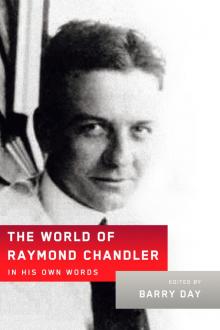 The World of Raymond Chandler: In His Own Words
The World of Raymond Chandler: In His Own Words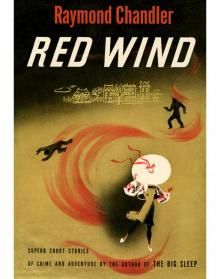 Red Wind: A Collection of Short Stories
Red Wind: A Collection of Short Stories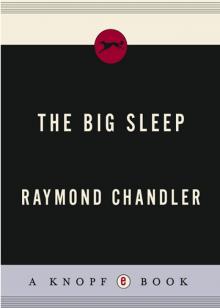 The Big Sleep
The Big Sleep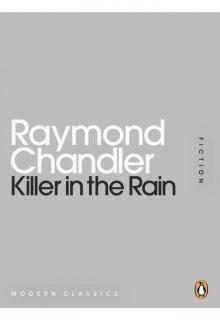 Killer in the Rain
Killer in the Rain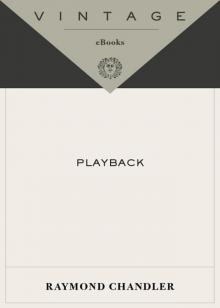 Playback
Playback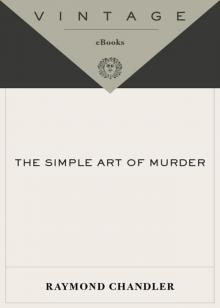 The Simple Art of Murder
The Simple Art of Murder The Bronze Door
The Bronze Door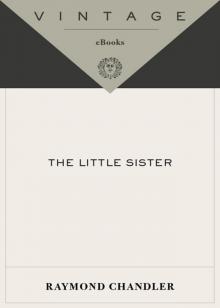 The Little Sister
The Little Sister The Lady in the Lake
The Lady in the Lake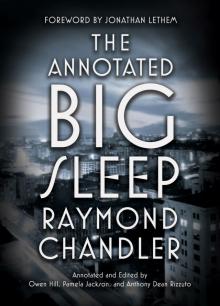 The Annotated Big Sleep
The Annotated Big Sleep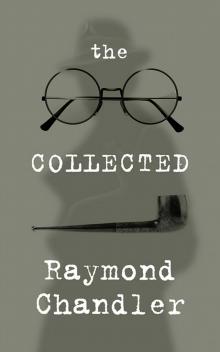 The Collected Raymond Chandler
The Collected Raymond Chandler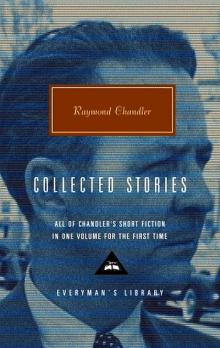 Collected Stories (Everyman's Library)
Collected Stories (Everyman's Library)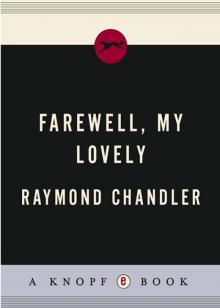 Farewell, My Lovely
Farewell, My Lovely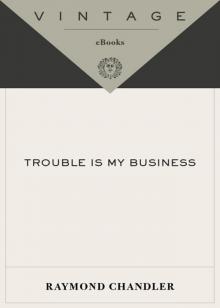 Trouble Is My Business
Trouble Is My Business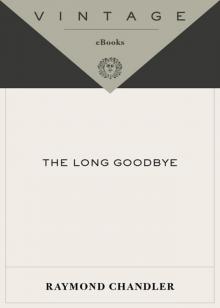 The Long Goodbye
The Long Goodbye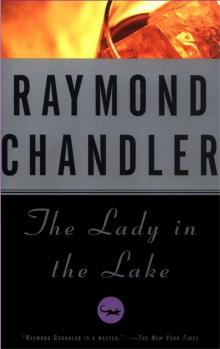 The Lady in the Lake pm-4
The Lady in the Lake pm-4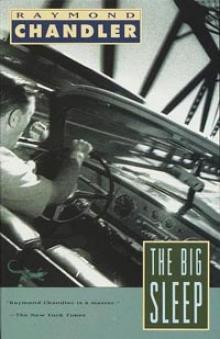 The Big Sleep pm-1
The Big Sleep pm-1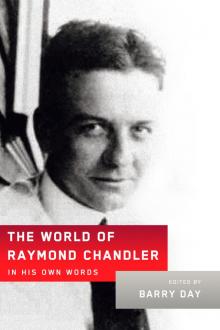 The World of Raymond Chandler
The World of Raymond Chandler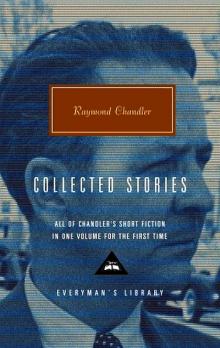 Collected Stories of Raymond Chandler
Collected Stories of Raymond Chandler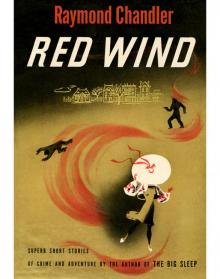 Red Wind
Red Wind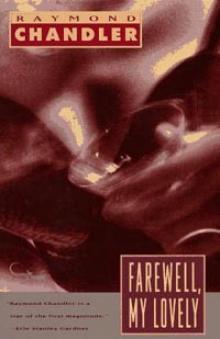 Farewell, My Lovely pm-2
Farewell, My Lovely pm-2 The Raymond Chandler Papers: Selected Letters and Nonfiction, 1909–1959
The Raymond Chandler Papers: Selected Letters and Nonfiction, 1909–1959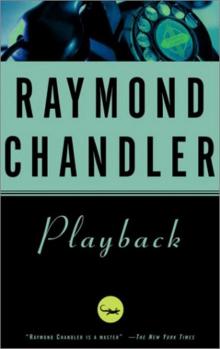 Playback pm-7
Playback pm-7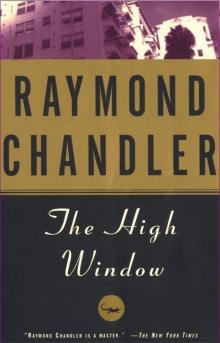 The High Window pm-3
The High Window pm-3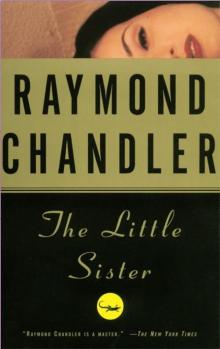 The Little Sister pm-5
The Little Sister pm-5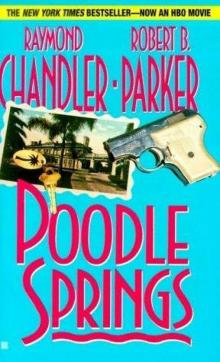 Poodle Springs (philip marlowe)
Poodle Springs (philip marlowe)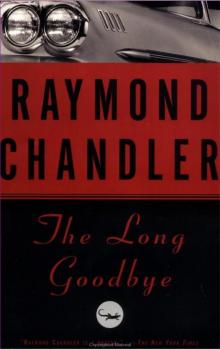 The Long Goodbye pm-6
The Long Goodbye pm-6